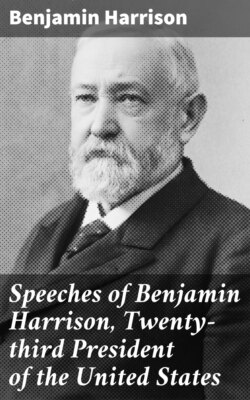Читать книгу Speeches of Benjamin Harrison, Twenty-third President of the United States - Benjamin Harrison - Страница 15
На сайте Литреса книга снята с продажи.
INDIANAPOLIS, JULY 13.
ОглавлениеTable of Contents
One thousand employees of the various railroads centreing at Indianapolis, organized as a Harrison and Morton Club—J. C. Finch, President, and A. D. Shaw, Marshal of the occasion—called on General Harrison on the night of July 13. Yardmaster Shaw was spokesman. General Harrison replied:
Gentlemen—Your visit is very gratifying to me, and is full of significance and interest. If I read aright the language of your lanterns you have signalled the Republican train to go ahead. [Applause and cries of "And she is going, too!"] You have concluded that it is freighted with the interests and hopes of the workingmen of America, and must have the right of way. [Cheers and cries, "That's true!" and "We don't have to take water on this trip, either!"] The train has been inspected; you have given it your skilled and intelligent approval; the track has been cleared and the switches spiked down. Have I read your signals aright? [Cheers and cries of "You have!" and "There's no flat wheels under this train!"] You represent, I understand, every department of railroad labor—the office, the train, the shop, the yard, and the road. You are the responsible and intelligent agents of a vast system that, from a rude and clumsy beginning, has grown to be as fine and well adapted as the parts of the latest locomotive engine. The necessities and responsibilities of the business of transportation have demanded a body of picked men—inventive and skilful, faithful and courageous, sober and educated—and the call has been answered, as your presence here to night demonstrates. [Cheers.] Heroism has been found at the throttle and the brake, as well as on the battle-field, and as well worthy of song and marble. The trainman crushed between the platforms, who used his last breath, not for prayer or message of love, but to say to the panic-stricken who gathered around him, "Put out the red light for the other train," inscribed his name very high upon the shaft where the names of the faithful and brave are written. [A voice: "Give him three cheers for that!" Great and enthusiastic cheering.]
This early and very large gathering of Republican railroad men suggests to me that you have opinions upon public questions which are the product of your own observations and study. Some one will say that the railroad business is a "non-protected industry," because it has to do with transportation and not with production. But I only suggest what has already occurred to your own minds when I say that is a very deceptive statement. You know there is a relation between the wages of skilled and unskilled labor as truly as between the prices of two grades of cotton cloth; that if the first is cut down, the other, too, must come down. [Cries of "That's just so!"] You know, also, that if labor is thrown out of one line or avenue, by so much the more will the others be crowded; that any policy that transfers production from the American to the English or German shop works an injury to all American workmen. [Great cheering.]
But, if it could be shown that your wages were unaffected by our system of protective duties, I am sure that your fellowship with your fellow toilers in other industries would lead you to desire, as I do and always have, that our legislation may be of that sort that will secure to them the highest possible prosperity [applause]—wages that not only supply the necessities of life, but leave a substantial margin for comfort and for the savings bank. No man's wages should be so low that he cannot make provision in his days of vigor for the incapacity of accident or the feebleness of old age. [Great cheering.]
I am glad to be assured to-night that the principles of our party and all things affecting its candidates can be safely left to the thoughtful consideration of the American workingmen—they will know the truth and accept it; they will reject the false and slanderous. [Applause.]
And now let me say in conclusion that my door will always be open to any of you who may desire to talk with me about anything that interests you or that you think will interest me. I regret that Mrs. Harrison is prevented by a temporary sickness from joining with me in receiving you this evening. [Great cheering.]
